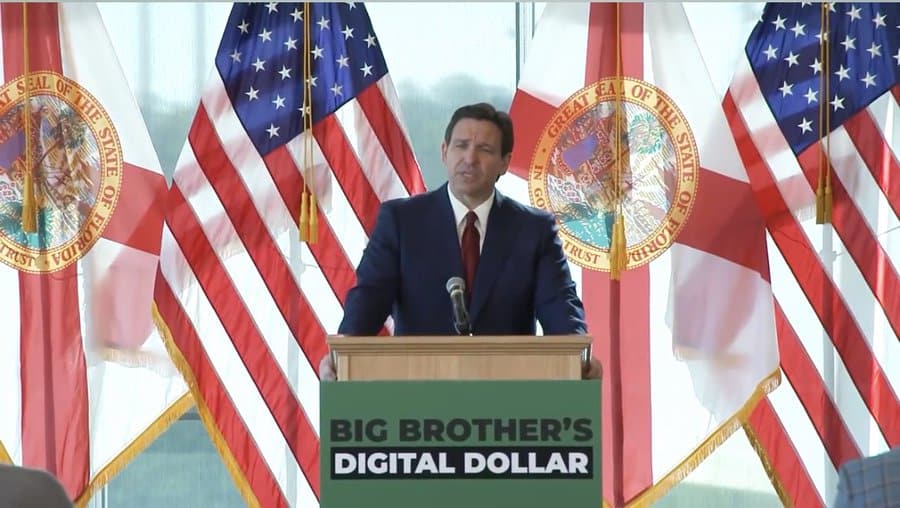
Der Gouverneur von Florida fordert ein CBDC-Verbot
- Ron DeSantis glaubt, dass ein CBDC der Regierung viel Macht verleihen und Datenschutzbedenken aufwerfen würde.
- Der Gouverneur von Florida stellte fest, dass CBDCs Innovationen ersticken und eine von der Regierung sanktionierte Überwachung ermöglichen werden.
- Das vorgeschlagene Gesetz verbietet auch die Verwendung ausländischer CBDCs in Florida.
Der Gouverneur von Florida, Ron DeSantis, von dem viele glauben, dass er 2024 für das Amt des Präsidenten der Vereinigten Staaten kandidieren wird, schlug ein Verbot digitaler Zentralbankwährungen (CBDCs) vor. Während einer Rede auf einer Pressekonferenz am Montag äußerte DeSantis Bedenken hinsichtlich der Ausgabe und Kontrolle eines digitalen Dollars durch die Federal Reserve.
Er bemerkte, dass ein CBDC geben würde die Regierung “Mehr Macht.” Gouverneur DeSantis erwähnte mehrere Regierungsinitiativen, die sich direkt auf die amerikanischen Verbraucher auswirken, darunter Sorgen über die Inflation, die Zinserhöhungen der Fed und den Druck auf die Banken.
Der republikanische Politiker bemerkt, “Die heutige Ankündigung wird die Verbraucher und Unternehmen Floridas vor der leichtsinnigen Einführung eines ‘zentralisierten digitalen Dollars’ schützen, der Innovationen ersticken und staatlich sanktionierte Überwachung fördern wird.”
DeSantis' Gesetzesvorschlag würde auch die Verwendung jeglicher von ausländischen Zentralbanken ausgegebener CBDCs in Florida verbieten. In seiner Stellungnahme rief der Gouverneur andere Bundesstaaten dazu auf, ähnliche Gesetze zu verabschieden. DeSantis erklärte: ’CBDCs ermöglichen der Regierung einen direkten Einblick in alle Verbraucheraktivitäten. Sie werden jede Möglichkeit nutzen, um in die Gesellschaft einzugreifen und ihre Ziele durchzusetzen. Bei digitalen Zentralbankwährungen geht es also letztlich darum, die Amerikaner zu überwachen und ihr Verhalten zu kontrollieren.“
Ohne eine Begründung anzugeben, wies DeSantis die Argumente, die Fed solle eine digitale Währung einführen, um Menschen ohne Bankkonto zu erreichen und Umweltprobleme anzugehen, weitgehend zurück. Er nannte Chinas Einführung des digitalen Yuan als Beispiel für den Versuch, “das Verhalten der Bürger zu überwachen, Ausgabengewohnheiten zu kontrollieren und den Zugang zu Waren und Dienstleistungen einzuschränken”, und verwies auf den Umgang der Regierungen der Bahamas und Nigerias mit digitalen Zentralbankwährungen (CBDCs).
DeSantis behauptete, dass eine föderale CBDC die Bedeutung von Gemeinschaftsbanken und Kreditgenossenschaften untergraben und Datenschutzprobleme aufwerfen würde. Seine Erklärung kommt Monate, nachdem Präsident Joe Biden eine Durchführungsverordnung erlassen hat, die die Bundesregierung anweist, die potenziellen Vor- und Nachteile eines CBDC zu untersuchen.







